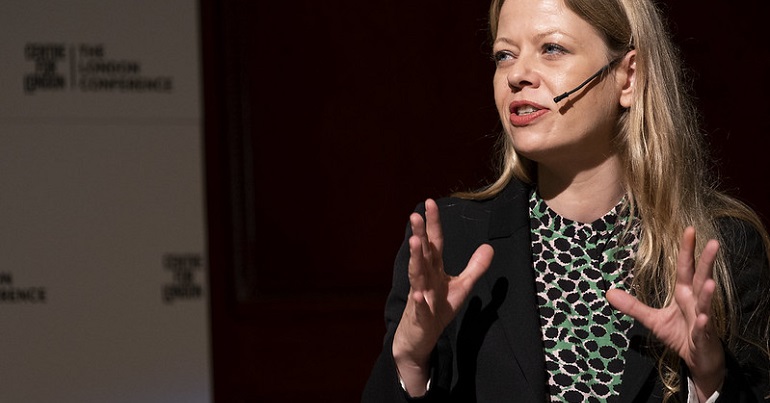Capitalism, Climate and Computing: Capital is Dead by McKenzie Wark

There is something quite refreshing about heretical writing. It feels like a pressure washer to the brain. Most of the time, individuals find themselves rejecting out of hand the initial message, but slowly over time they begin questioning and probing. A near wholescale rejection of an intellectual tradition always upsets. McKenzie Wark finds herself engaged in an act of self-professed heresy within Capital is Dead.
Wark argues that not only do we face a failure to articulate alternatives to capitalism, but we often fail to analyse the present outside of the frame of capital. Capitalism, even critiques of it, have become like theology, with an ahistorical and unchanging god central to all thinking. Such a theological analysis of Marxist thinking is not new. For example, Bertrand Russel was famous for making such a comparison. What distinguishes Wark’s theological critique is a focus on the current forces of production themselves, just as socialists did in originally articulating capitalism. The thinking which first gave birth to capitalist language is borrowed and turned against their creation.
My introduction to Wark was Molecular Red; her work focusing on climate change and its relations with critical theory. A smart-alec undergrad student, I initially failed to appreciate the numerous insights the book offered. Luckily, in the intervening years, I have found its ideas slowly dissolving into my thinking. Absorption, especially of ideas, takes time and I now find myself starting to attempt to borrow (or detourn as Wark prefers) her concepts. Consequently, I began reading Capital is Dead with the same hope. I was not let down.
Something worse than capital?
So, if capital is dead, what replaced it? Wark argues key elements of the world system rely on information technologies to extract value without capital. The ownership of the means of production is now less important. Instead the information technologies that organise the means of production are central. These technologies have emerged as a new force of production. Through this shift, the world is experiencing new classes, new politics, and most importantly, new opportunities.
This is not to suggest that somehow Siri and Amazon succeeded where left wing movements failed and abolished capitalism. It is to assert these new relations are emerging within and across existing political conflicts. Just as capitalism co-exists with earlier forms of serfdom and land-lordship, so too do the new classes engage in struggle among capitalists and landlords. What becomes key is the power of ‘asymmetries of information’ and their manipulation due to control of ‘vectors’. One wins by controlling the server, the wiring, the code. In particular, intellectual property law takes a key role in creating new relations of production. This new relation then forms the basis for new social classes.
Building on earlier work in the Hacker Manifesto Wark argues that the two new classes are the hacker and the vectoralist. The hacker class produces information, whether in the form of new software or search histories from browsing online at 2am. The vectoralist class only needs to own the vector upon which this information operates to profit. This recognises that some of the largest businesses in the world, rather than owning capital, rely on information to profit. Rather than extracting energy from the flesh of labour, energy is sapped from the mind. The vectoralists have all the cookies, and they increasingly refuse to share them.
Thinking with vectors
When does capital die? The spread of different information technologies, and necessary changes to the law of intellectual property, likely occur unevenly across the globe. Wark rightly looks to the emergence of vectors in European war economies, but the political economy of their current spread elsewhere needs theorising. How does the transition work in areas of the world only recently incorporating information tech as a force, perhaps even into pre-capitalist relations? At what point does a vector stop simply fuelling commodification but turns inward and changes the commodity form itself? The debates around when and how capitalism emerged show the difficulty in attempting to answer questions like this. Wark has somewhat opened a pandora’s box, but that is the point of the work. New opportunities for analysis are made possible by the break with capitalism.
Wark suggests the failure so far to appreciate these changes comes in part from the collapse of socialist scientist movements and their engagement with politics during the 20th century. Such scientists, like J. D. Bernal, and their own style of Marxist thinking, seemed to be well placed to recognise the new system. Sadly, due to failures of both a political and academic nature, this movement found itself side-lined. But herein lies Wark’s turn towards climate change and the anthropocene. The emergence of thinking around the anthropocene and climate by scientists may lead to a return of Bernal-like politics. Radical forms of thinking return as necessary to confront climate breakdown.
It is in this turn towards thinking around nature, and its politics that Wark’s work becomes the most obtuse. I suspect I will be re-reading elements of this chapter for months to come attempting to grapple with the thinking. The difficulty in Wark’s text are often due to a tendency to dart between thinkers. But it is predominantly due to Capital is Dead being an attempt to form a new language. Wark is attempting to articulate ideas and language around acceleration, inertia and extrapolation in response to revolutionary social potential and nature.
For a Vulgar Marxism
Wark begins to close the Capital is Dead by proposing a ‘vulgar Marxism.’ Critiquing much socialist thought from the last 100 years, Wark suggests novel ways of thinking about our world. This vulgarity looks to the mediated experiences of the most marginalised as key to understanding forces of social change. Such vulgar marxism reflects the ‘low theory’ which Wark has further analysed in Molecular Red. Vulgarity is grounded, a focus not on high theory or systems of thought, but a critical focus on lived experience. Vulgarity is a need to live in our own time, and to look for the changes which mark the present as a novel epoch.
This work refuses to limit itself to one genre or academic discipline, in line with the vulgar Marxism promoted. Consequently, readers interested in a number of issues will find something in this book. There are discussions around philosophy, climate change, and information technologies mixing across the text. As a climate activist from Huddersfield, it brought me delight when I found Harold Wilson sharing a chapter with Donna Haraway. Others will find their own gems.
Many will disagree with Wark’s argument, that will always be the role of such works. The text leaves me with many questions, just like any good piece of heresy should. For anyone aiming to understand the new tech economy Capital is Dead is a controversial but rewarding text.



Leave a Reply